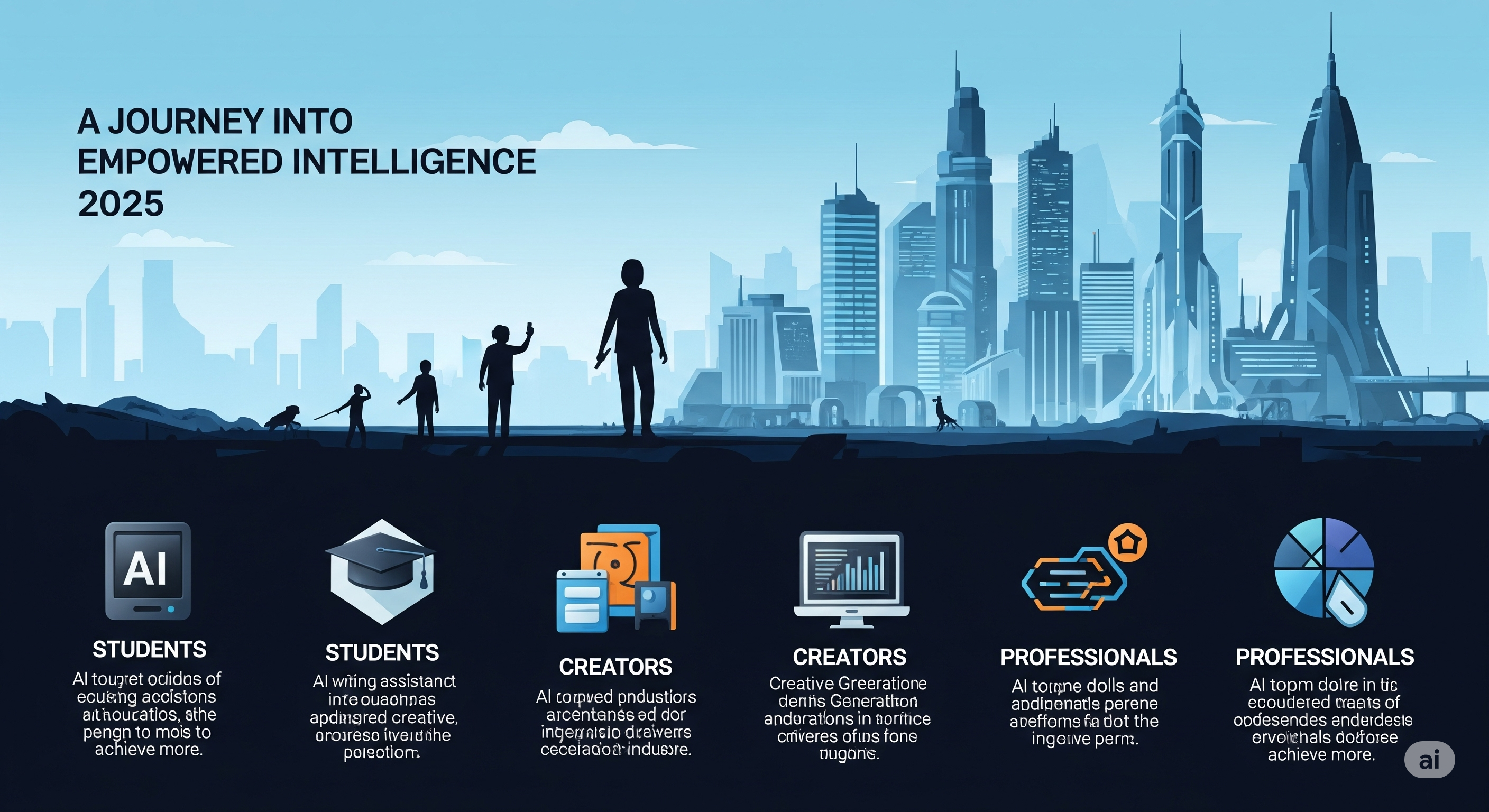
1. Preface – Why AI Tools Matter in 2025
In a world humming with digital meter,
AI tools stand like silent muses, helping hands enciphered in sense,
bruiting speed into slow tasks, and clarity into chaos.
Whether you are burning night oil painting for examinations,
sketching a vision, or leading a platoon through deadlines —
AI is the quiet force that lifts the fog.
The companion ahead is for learners, makers, doers.
Each section, a chart. Each tool, a compass.
AI tools no longer belong to tech titans or masterminds alone.
They’re scrapbooks, paintbrushes, timetables, associates.
And this companion? It’s your step into that empowered hereafter.
2. What Are AI Tools and How Do They Work?
AI tools are software programs that suppose with you.
They use machine literacy and data patterns
to help, automate, or indeed ameliorate decision-timber.
Whether it’s typing suggestions, automated design layouts,
or voice-to-text transformations —
AI tools learn from you and evolve with use.
They work by:
- Processing natural language (e.g., what you class or speak)
- Feting patterns (e.g., your jotting style, task frequence)
- Offering results or creating happy incontinently
They are not magic, but they feel like it.
And the best part?
You don’t need to decode to use them.
3. Benefits of Using AI Tools Across Fields
Using AI tools is like having a personalized adjunct
who knows your pace, predicts your requirements, and never sleeps.
For scholars:
- Get summaries of long textbooks
- Translation for clarity
- Improve grammar instantly
For creators:
- Auto-generate content ideas
- Edit audio and video with precision
- Design with intuitive suggestions
For professionals:
- Automate meetings
- Schedule dashingly
- Analyze reports with ease
These tools save hours.
They reduce internal cargo.
They make room for more living, thinking, creating.
4. AI Tools for Scholars — Learn Smarter
Study Sidekicks
Notion AI helps organize notes, produce schedules,
and track assignments with AI-generated monuments and summaries.
Wolfram Alpha solves complex equations
and provides explanations, acting like a live instructor.
Writing Aides
Grammarly goes beyond spelling —
it melodies tone, clarity, and structure.
Quillbot translates and simplifies tough readings,
making modification royal.
Research Simplifiers
Otter transcribes lectures, allowing you to concentrate on listening.
SciSpace helps crack scientific papers
and explains concepts in nonprofessional’s terms.
Together, these AI tools reduce academic collapse and edge focus.
5. AI Tools for Creators — Create Brighter Content
Writing Tools
Jasper AI helps bloggers, marketers, and storytellers
generate high-quality content quickly.
It writes captions, product descriptions,
and social posts in seconds.
Graphic Design Tools
Canva AI offers design suggestions, auto-generates illustrations from text,
and matches brand colors without manual tweaking.
It creates logos, videos, and voiceovers with zero design experience.
Video Editing Tools
Runway ML and Pictory use AI to edit, cut, and even animate clips.
Creators can turn raw footage into polished content — no pro software needed.
These AI tools empower creators to focus on storytelling
rather than the technical grind.
6. AI Tools for Professionals — Work Sharper
Communication and Scheduling
Otter.ai automatically transcribes meetings,
extracts tasks, and sends follow-ups.
Clockwise manages your calendar, finds focus time,
and reduces meeting load.
Productivity and Automation
ClickUp AI suggests task priorities, writes updates,
and offers performance insights.
Trello Butler AI automates workflows, notifications,
and recurring tasks.
Data Management Tools
Tableau AI turns raw data into beautiful visual dashboards.
Zoho Analytics gives automated insights, predictions, and trends.
With AI tools, professionals don’t just do more.
They do better.
7. Integrating AI Tools into Your Workflow
Adoption starts with observation.
Identify your repetitious tasks.
Chart a workflow.
Introduce one AI tool at a time.
Monitor time saved and output improved.
Do not force-fit AI tools.
Let them fill the natural gaps.
Use tools that work together.
For example, pair ChatGPT with Notion for content creation.
Or Grammarly with Google Docs for real-time editing.
Small changes bring big relief.
8. Limitations and Ethical Use of AI Tools
AI tools are powerful, but not perfect. They can:
- Misinterpret context
- Repeat impulses from training data
- Create over-reliance in critical thinking
Ethical use matters.
Always double-check AI-generated work.
Give credit when due.
Use AI tools to help – not replace – your unique creativity.
9. FAQs About AI Tools
Q: Can AI tools be used in examinations or academic sessions?
Not always. Always follow institutional guidelines.
Q: Are AI tools replacing jobs?
No. They are changing jobs.
The future belongs to those who co-create with AI.
Q: Are there free AI tools that are good?
Yes — Grammarly, Notion AI, and Otter.ai offer strong free plans.
Q: How do I know which AI tool is best for me?
Match the tool to the problem.
Don’t use all – use the right one.
10. Conclusion – The Future Belongs to the Stoked Mind
AI tools are no longer sci-fi – they’re daily life.
They don’t steal your voice. They edge it.
They don’t shroud your ideas.
They light the way forward.
From note-takers to CEOs,
from blank pages to final drafts –
AI tools stand by, always ready.
So whether you study, create, or lead –
let AI help you breathe a little easier.
Focus on what only you can do.
Let AI handle the rest.



poteanisha@gmail.com